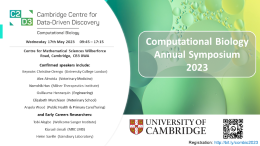Wed, 17 May 2023 9:45 AM - 5:15 PM
We warmly invite you to the C2D3 Computational Biology Annual Symposium 2023!
This event is open to everyone in the Computational Biology Community.
Registration
(Registration will close at 23:59 on Tuesday 9th May.)
Participants: closed
Speakers and Chairs: closed
Programme
09.45-10.15 Registration and arrival refreshments
10.15-10.20 Opening with Gos Micklem (Genetics / Applied Mathematics and Theoretical Physics)
Session 1 - Chair: Mike Boemo (Pathology)
- 10.20-10.40 Helen Saville Mathematical modelling of a bioreactor for platelet production (Sainsbury Laboratory Cambridge University (SLCU))
- 10.40-11.00 Kiarash Jamali Graph Neural Networks for automated atomic modelling and protein identification in cryo-EM maps (MRC Laboratory of Molecular Biology)
- 11.00-11.20 Tobi Alegbe Utilising single-cell RNA-seq to map expression quantitative trait loci in the healthy and CD-afflicted terminal ileum (Wellcome Sanger Institute)
- 11.20-12.20 Keynote: Christine Orengo FRS Using AlphaFold and Large Language Models to Explore Protein Evolution and the Impacts of Genetic Variations (Structural & Molecular Biology, University College London)
12.20-13.00 Lunch
Session 2 - Chair: Hannah Earley (Applied Mathematics and Theoretical Physics)
- 13.00 - 13.40 Elizabeth Murchison Horizontal gene transfer in a transmissible cancer (Veterinary Medicine)
- 13.40 - 14.20 Angela Wood Using population-wide electronic health records to advance understanding of contemporary trends in cardiovascular disease in England (Public Health & Primary Care/Turing)
- 14.20 - 15.00 Namshik Han Data-driven computational approaches for identifying novel therapeutic targets and drug repositioning opportunities (Milner Therapeutics Institute)
15.00-15.20 Break with refreshments
Session 3 - Chair: Aylwyn Scally (Genetics)
- 15.20 - 16.00 Guillaume Hennequin Reading the (neu-)runes: data-driven learning of neural dynamics (Engineering)
- 16.00 - 16.40 Alex Almeida Large-scale metagenomic methods to uncover new biological insights into the human gut microbiome. (Veterinary Medicine)
- 16.40-17.15 Drinks reception
Organised by C2D3 Computational Biology (formerly the CCBI)
Social Media
Speaker's Twitter Handles
Tobi Alegbe (Wellcome Sanger Institute) - @Tobioinformatic
Alex Almeida (Veterinary Medicine) - @alexmsalmeida
Namshik Han (Milner Therapeutics Institute) - @HanNamshik
Guillaume Hennequin (Engineering) - @GJEHennequin
Kiarash Jamali (MRC Laboratory of Molecular Biology) - @jamaliki1998
Elizabeth Murchison (Veterinary Medicine) - @tcgcambridge
Speaker Biographies
Keynote Speaker - Professor Christine Orengo, University College London

The Orengo group develops computational methods for classifying proteins into evolutionary families. We exploit structural and sequence data to do this and a major interest is in the development of algorithms to recognise very distant evolutionary relationships. Our protein domain classification is available through the widely used CATH database. The release of hundreds of millions of predicted protein structures by DeepMind is allowing us to substantially increase the amount of information we have on protein families in CATH to explore structural mechanisms driving functional divergence. We are researching the extent to which functions are conserved across protein families and are developing methods for predicting the impacts of genetic variations. We are also exploring how functions change during evolution following alternative splicing. Recently we developed AI based deep learning methods for classifying proteins and predicting variant impacts. Our methods for exploring function evolution in protein families are being applied to analyse four large and functionally diverse superfamilies, the HUPs, the Triterpene synthetases, the GNATS and the Alpha-Beta hydrolases in BBSRC and EU funded collaborations with experimentalists. We have also developed methods for predicting protein associations and functional networks to detect genes implicated in ageing and immune response.
Dr Alex Almeida

Throughout my research career I have specialized in the development and application of bioinformatics and genomic approaches to make biological discoveries with relevance to human health. I obtained my PhD in Microbiology at the Institut Pasteur in Paris.
After my PhD, I was awarded an EBI-Sanger Postdoctoral (ESPOD) Fellowship and relocated to Cambridge to expand my research to metagenomic studies of the human gut microbiome. Using large-scale computational methods, we discovered thousands of uncultivated bacterial species in the human gut microbiome, more than tripling the number of gut-associated species previously known (Almeida et al. Nature 2019 and Almeida et al. Nat. Biotechnol. 2021). I have also been involved in a number of national and international collaborative projects, one of which led to the discovery of over 140,000 distinct viruses in the human gut microbiome, of which 50% were unknown before (Camarillo-Guerrero et al. Cell 2021).
Now, I have established a new research team at the Department of Veterinary Medicine in Cambridge, funded by an MRC Career Development Award, to understand the role that the hidden, uncultured microbiome plays in human health and disease.
Dr Namshik Han

I am a computational drug discovery scientist, coming from a background in machine learning, computational biology, cancer genomics and cancer epigenomics. I am Head of Computational Research & AI at Milner Therapeutics Institute in University of Cambridge and also Associate Faculty at Cambridge Centre for AI in Medicine in the same University. I also have an Adjunct Professor position at Yonsei University College of Medicine. My lab develop and apply dedicated and bespoke Artificial Intelligence technologies that deal with the uncertainty and complexity of biological datasets to reveal novel disease pathways and mechanisms. Projects within the lab include (1) identification of new therapeutic targets in a variety of diseases, (2) stratification of patients to improve personalised medicine, (3) prediction of efficacy and safety of new and existing drugs and (4) identification of drug (re)positioning opportunities.
In addition to my academic research, I have a passion for working at the interface between academia and industry to apply my research to real-world problems. In my case this is in therapeutics and patient care where AI promises to revolutionize the ability to identify disease mechanisms and potential drug targets, informing patient care from disease diagnosis through to treatment. Towards this aim, I facilitate access of the Milner Therapeutics Consortium partner organizations to cutting-edge AI technology and to develop new computational methods fulfilling the global mission of identifying new or better therapies from the analysis of biological data. Furthermore, I contributed to the establishment of Storm Therapeutics. I co-founded two start-ups: (1) KURE.ai to develop immune-oncology NK cell therapy and (2) CardiaTec to develop innovative drugs for cardiovascular diseases.
Dr Guillaume Hennequin

I study the link between physiology and behaviour from a computational viewpoint. I am interested in the dynamics of sensory and motor cortices, and how they support complex computations such as movement generation or perceptual inference. Through methods from control theory, statistical physics and dynamical systems, my research has led to a couple of models of neuronal population dynamic, that explain some key aspects of movement-related activity in M1, as well as the stimulus dependence of activity variability in many cortical areas.
Prof. Elizabeth Murchison

Elizabeth Murchison is Professor of Comparative Oncology and Genetics at the University of Cambridge, Department of Veterinary Medicine. She leads the Transmissible Cancer Group, working to further understand transmissible cancers in dogs and Tasmanian devils. Elizabeth grew up in Tasmania and performed her undergraduate studies in genetics and biochemistry at the University of Melbourne. After moving to the US to perform her PhD in molecular biology and genetics at Cold Spring Harbor Laboratory, Elizabeth returned to Australia where she initiated genetic studies of the Tasmanian devil facial tumour 1 (DFT1). In 2009, she was awarded an NHMRC Overseas Biomedical Fellowship to travel to the Wellcome Sanger Institute, UK, where she was involved in sequencing the Tasmanian devil genome as well as genetic analysis of DFT1 and CTVT. Elizabeth joined the University of Cambridge, Department of Veterinary Medicine in 2013. In her spare time, Elizabeth enjoys hiking in Tasmania’s remote wilderness.
Dr Angela Wood

Angela’s research focuses on the frontiers of big data and epidemiology, underpinned by major population resources and informed by applied questions of major population health and clinical salience. She has developed novel methods and applied them in the analysis of large, complex datasets (e.g., ~67M individuals in CVD-COVID-UK consortium; >3M participants in Emerging Risk Factors Collaboration, EPIC-CVD and UK Biobank), providing new insights into chronic diseases, mainly cardiovascular disease, as well as COVID-19 and blood donation.
With the BHF Data Science Centre and in partnership with NHS Digital, she has helped to establish access to the England-wide Electronic Health Record resource on >57M people and is developing innovative and principled methods for reproducible analysis of the resource.
In biostatistics methodology research, she focuses largely on methods for utilising electronic health records to produce unbiased results for medical/epidemiological research, including handling measurement error, using repeated measures of risk factors, missing data problems, multiple imputation, risk prediction and meta-analysis.

Read more about C2D3 Computational Biology here
